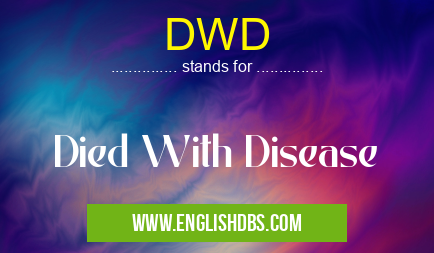What does DWD mean in DISEASES
DWD stands for "Died With Disease," and it is used to refer to someone who has passed away due to an illness or condition. It is important to note that DWD does not necessarily mean that the cause of death was directly related to a disease, but rather that it was present at the time of death. This terminology is commonly used in medical records, particularly in cases where a deceased person's medical history can provide crucial information about their state of health at the time of passing.

DWD meaning in Diseases in Medical
DWD mostly used in an acronym Diseases in Category Medical that means Died With Disease
Shorthand: DWD,
Full Form: Died With Disease
For more information of "Died With Disease", see the section below.
Definition
DWD is an acronym used in medical records that refers to someone who has died while suffering from a disease or medical condition. The term implies that the illness had some sort of impact on their passing, however it does not necessarily mean that the illness was the direct cause of death. For example, if a person dies from heart failure caused by another underlying condition such as diabetes, then their death would be classified as DWD due to the presence of diabetes even though its presence did not directly cause their death.
Significance
The significance of distinguishing between diseases and other causes of death can be extremely important for doctors and researchers when studying certain illnesses and determining how effective treatments are at preventing deaths from those illnesses. By recognizing DWD on medical records, physicians are able to recognize patterns in mortality rates and determine which diseases are more likely than others to lead to fatality in patients. Similarly, this information can help scientists develop new treatments or medications with higher success rates when it comes to managing dangerous illnesses.
Essential Questions and Answers on Died With Disease in "MEDICAL»DISEASES"
What is DWD?
DWD stands for Died With Disease. It is a term used to describe a person who has died due to a medical condition or illness, rather than any other cause of death.
What are the different types of diseases that can lead to someone Dying with Disease (DWD)?
Any type of disease that affects the body can be a cause of death and be classified as dying with disease. This includes chronic illnesses such as cancer, congestive heart failure, and organ failure, as well as acute infections like sepsis or pneumonia.
Is DWD considered natural causes?
Yes, generally speaking, if someone dies due to an underlying medical condition then it is classified as Death with Disease and considered natural causes.
What are the long-term implications of someone dying with disease?
The long-term implications depend on the type and severity of the disease or illness. For example, someone who has died from cancer may have left behind family members who need emotional support in dealing with their grief. Other effects may include financial hardship for those left behind.
How does DWD affect public health?
Public health services must take into account the number of people dying from conditions such as cancer and heart disease since these types of illnesses are so common in our society. In addition, there may be social ramifications if many people in one area are affected by an outbreak of a particular infectious disease which could lead to death from DWD.
Are there any treatments available for someone suffering from an advanced form of something which could lead to death by DWD?
In some cases yes - depending on the specific condition or illness it may be possible to delay or even prevent death using supportive care or medical treatment options such as chemotherapy. However, in other cases this may not be possible if the disease is too far advanced or treatment options are limited.
Does hospice care provide end-of-life support for those Dying with Disease (DWD)?
Yes, hospice care can provide comfort and care for patients approaching the end stages of life due to an underlying terminal illness or condition. Hospice professionals can help families cope with difficult emotions during this time and manage pain symptoms associated with progressive diseases such morphine and hydromorphone use.
Does insurance cover expenses related to someone Dying With Disease (DWD)?
It depends on your specific insurance provider but typically insurance policies will cover costs associated with care related to terminal illness including medications and treatments up until death occurs.
Final Words:
In conclusion, DWD (Died With Disease) is an acronym frequently used in medical records which refers to individuals who have passed away while suffering from one or more illnesses or conditions. This important distinction helps doctors and researchers know which diseases are most likely responsible for fatalities so they can better manage patient care and research potential treatments.
DWD also stands for: |
|
| All stands for DWD |
